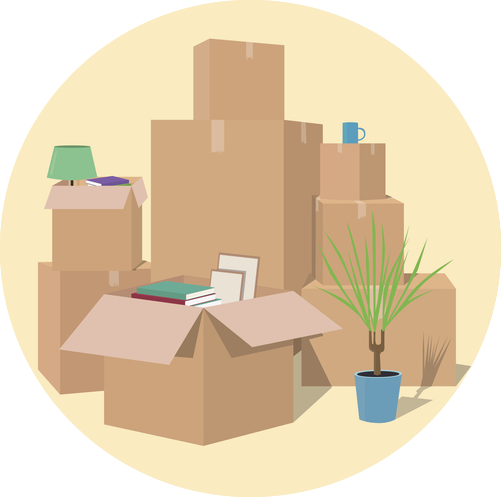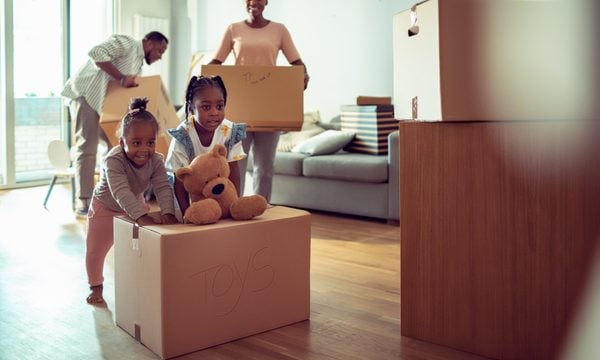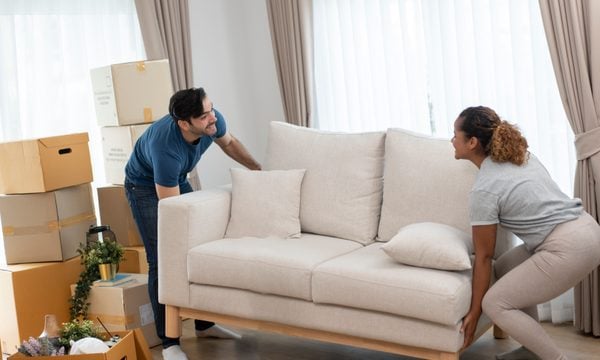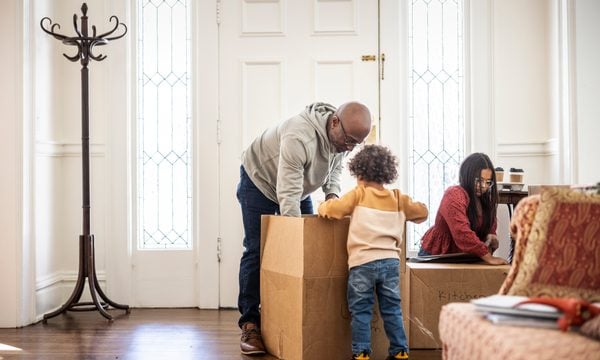17 Places to Get Free or Cheap Moving Boxes
The price to buy moving boxes ranges from $1 to $25 depending on size, but there are places to get them free or cheap.

Some or all of the mortgage lenders featured on our site are advertising partners of NerdWallet, but this does not influence our evaluations, lender star ratings or the order in which lenders are listed on the page. Our opinions are our own. Here is a list of our partners.
Regular moving boxes typically cost anywhere from about $1 to $3.75 each, but specialty boxes (such as wardrobe or TV boxes) generally run $10 to $25 each. You may, however, find free boxes through local businesses, schools, box exchanges, libraries, yard sales, online networks and more.
Advertisement
Moving box prices
The retail price of new moving boxes varies according to the seller, box size and whether you need regular or specialty boxes. Here’s about what you can expect to pay for some popular box types.
| Box type | Price range |
|---|---|
| Small box. | $1 to $1.70. |
| Medium box. | $2.35 to $2.79. |
| Large box. | About $3. |
| Extra large box. | About $3.75. |
| TV/picture box. | About $10 to $25. |
| Wardrobe box. | $8 to $12. |
| Dish box. | About $15. |
Although these prices may not seem like all that much, the cost of moving an entire household can add up quickly — especially when you consider that you may need dozens of boxes.
For example:
- 60-box move: If you needed 20 medium boxes at $2.50 each ($50), 38 large boxes at $3 each ($114), one wardrobe box at $8 and one TV box at $25, your total cost for moving boxes would be $197.
- 85-box move: If you needed 30 medium boxes at $2.50 each ($75), 50 large boxes at $3 each ($150), 3 wardrobe boxes at $8 each ($24) and 2 TV boxes at $25 each ($50), your total cost for moving boxes would be $299.
How many moving boxes do I need?
For a quick, ballpark estimate of how many boxes you might need, start with the type of home you live in and how many bedrooms you have. For example, here’s how one moving company calculates it.
| Home size | Approximate number of moving boxes needed |
|---|---|
| Studio apartment. | 42. |
| One-bedroom apartment. | 51. |
| Two-bedroom apartment. | 70. |
| Three-bedroom house. | 97. |
Of course, you may need more or fewer boxes. To determine your moving box needs more specifically, consider these factors:
- Square footage: The larger your home, the more boxes you’ll likely need.
- Decorating style: If most of your surfaces are covered with knick-knacks and wall art, you’ll likely need more boxes.
- Time in home: The longer you’ve lived at an address, the more stuff you’ve likely accumulated.
- Number of rooms: The more rooms your home has, the more boxes you’ll need. Be sure to consider any basement, attic or garage space.
- How many people live in the home: The more people living in a home, the more boxes you’ll likely need.
Where to get cheap or free moving boxes
Here are 17 places you may be able to find low or no-cost moving boxes.
1. People you know
Ask neighbors, friends and family if they have boxes you can take off their hands or if they know someone who does. Anyone who gets regular package deliveries should have at least some boxes on hand (large produce delivery boxes make good moving boxes), and if anyone you know has just moved, you may be able to get all the boxes you need from a single source. Be sure to check that boxes are free of damage and can be properly sealed.
2. Your own delivery boxes
Every delivery that comes to your house has the potential to bring another free moving box your way, and you’ll likely receive boxes of varying sizes. You’ll need a few months to collect what you need, so be sure to start saving boxes instead of taking them to recycling as soon as you know you’ll be moving.
3. The Freecycle Network
The Freecycle Network is a nonprofit movement that encourages hanging onto and reusing things to keep them out of landfills. Sign up for free online or with the Freecycle mobile app, join a local town group (or a few of them!) and post about what you’d like to give away or what you’re looking to receive (moving boxes and supplies). Once you’ve connected with another member with boxes to give away, set up a meeting time and place to pick up your boxes. Before accepting used boxes, always check them carefully to make sure they’re not soiled or damaged.
4. Facebook Marketplace and Facebook community groups
Facebook Marketplace and other Facebook community groups give members an opportunity to search for what they need or post what they’d like to get rid of — and you may be able to find someone in your area with moving boxes they’d like to give away or sell cheaply. To use Facebook Marketplace, log into your Facebook account and search Facebook Marketplace for “free moving boxes,” filtering your search for location. Then you set up a time and place to pick up your boxes. You can also join and search other Facebook community groups to see if anyone has boxes to give away or sell. Before accepting used boxes, always inspect them to make sure they’re in good condition.
5. U-Haul Customer Connect
U-Haul Customer Connect offers a box exchange program that allows customers to find, give away or sell moving boxes. Simply visit the website and type “moving boxes” in the search box to see a list of customers with available moving supplies and where they’re located. You can then click on any offers in your area and respond to communicate your interest. Be aware that there may not be anyone with boxes to share in your area, and that those available may have a small fee.
6. BuyNothing
The BuyNothing Project is a benefit corporation that provides a forum for people to give away or get what they need for free. You access BuyNothing via its mobile app. Create an account, set your viewing radius (BuyNothing recommends starting with a 20 mile radius) and search for moving boxes in your area. You can then arrange a time and place for pickup. Be aware that there may not always be moving boxes available in your area, and used boxes may be damaged or dirty, so inspect them carefully before accepting them.
7. OfferUp
OfferUp is a buying and selling platform available through a mobile app. You create an account and do a search for moving boxes to see if anyone in your area has any for sale. If an offer interests you, you message the seller to negotiate the price and set up a pickup time and place. OfferUp lets you see the sellers’ ratings and transaction history.
8. Nextdoor.com
This site allows member neighbors to buy, sell and borrow items, as well as share news and recommendations. You can sign up online or through its mobile app. To find boxes, you do a search (or post a query) to find out if anyone in your area has moving boxes to sell or give away. You then communicate via the Nextdoor platform to negotiate a price and a time and place for pickup.
9. Yard sales
You’ll often find boxes in plain view at yard sales, holding books or other items for sale. The host of the yard sale may be willing to part with these boxes after the sale, so all you need to do is ask. You may be more successful if you speak to the host close to the end of the sale, when most of the items have already been sold.
10. Your place of work
Many businesses receive supply deliveries regularly, and those supplies often come in boxes that work well for moving. Ask your supervisor if your company has unpacked any deliveries recently and if there are boxes that you can take. Even if no boxes are available at the moment, the company may be willing to hold boxes for you when they arrive and are unpacked.
11. Libraries
Boxes used to deliver shipments of books to libraries have to be sturdy in order to accommodate the weight of books. Call or visit your local library to see if any boxes are available. Book boxes are perfect for your books or smaller items such as shoes or decorative items.
12. Local schools and colleges
Educational institutions get deliveries of books and supplies, particularly in the fall or at the start of a new term. Call first to see if boxes are available and where/when you can pick them up. You may want to make a separate call to the school’s bookstore to see if any strong book boxes are also available.
13. Apartment complexes
Many apartment complexes have a high turnover rate, which increases the chances that someone is moving in when you need moving boxes. Call or visit the apartment complex’s management office to find out if boxes might be available and when/where you can pick them up.
14. Banks
Financial institutions receive regular deliveries of paper and promotional materials, which tend to come in sturdy boxes that lend themselves well to moving. Call or visit your bank and other local financial institutions to see if they have boxes or if they’d be willing to hold them for you when they arrive.
15. Local businesses
Most local businesses receive regular deliveries in boxes that just get recycled if no one takes them. You can call or visit businesses in your area to ask if any boxes are around for you to take. Businesses may be more willing to give you boxes if you’re a regular customer they know, but it’s fine to ask even if you’re not. Be especially careful to inspect food boxes for evidence of insects, pests and moisture. Also inspect boxes that contained chemicals. Here are a few of the types of businesses that often have boxes on hand:
- Auto shops.
- Coffee shops.
- Arts and crafts stores.
- Wholesale stores.
- Furniture and appliance stores.
- Warehouse clubs.
- Liquor stores.
- Grocery stores.
- Restaurants.
- Pharmacies.
16. Office buildings
Large office buildings house multiple businesses that all get regular supply deliveries. To find out if boxes are available, talk to the person working at the building’s front desk.
17. Recycling centers
Many unwanted boxes end up at recycling centers. Although some towns require boxes to be broken down before they’re picked up for recycling, not all areas are that strict. You may find intact boxes that have been dropped off in excellent condition. Speak with the recycling center attendant to see if you can take home any acceptable boxes you find.
Article sources
NerdWallet writers are subject matter authorities who use primary,
trustworthy sources to inform their work, including peer-reviewed
studies, government websites, academic research and interviews with
industry experts. All content is fact-checked for accuracy, timeliness
and relevance. You can learn more about NerdWallet's high
standards for journalism by reading our
editorial guidelines.
More like this
Related articles
AD
Stress-Free Moving with Safeway
Call a moving coordinator at Safeway Moving Systems Inc.
Mon–Thu 9a–8p, Fri 9a–7p, Sat 10a–7p, Sun 10a–4p
Lock In 10% Off Today
on moveBuddha's website

AD

Stress-Free Moving with Safeway
- Transparent flat-rate pricing with no hidden fees;
- GPS-tracked trucks and barcoded inventory system for peace of mind;
- Special Offer: Mention "10%" for a limited-time NerdWallet discount.
Call a moving coordinator at Safeway Moving Systems Inc.
Mon–Thu 9a–8p, Fri 9a–7p, Sat 10a–7p, Sun 10a–4p

Lock In 10% Off Today
on moveBuddha's website












